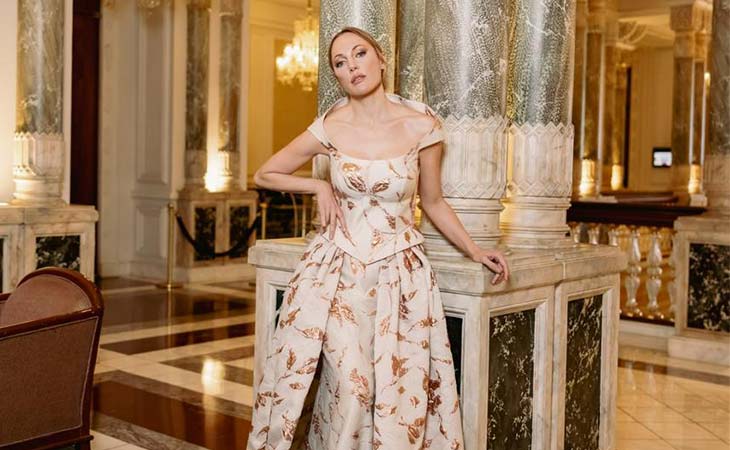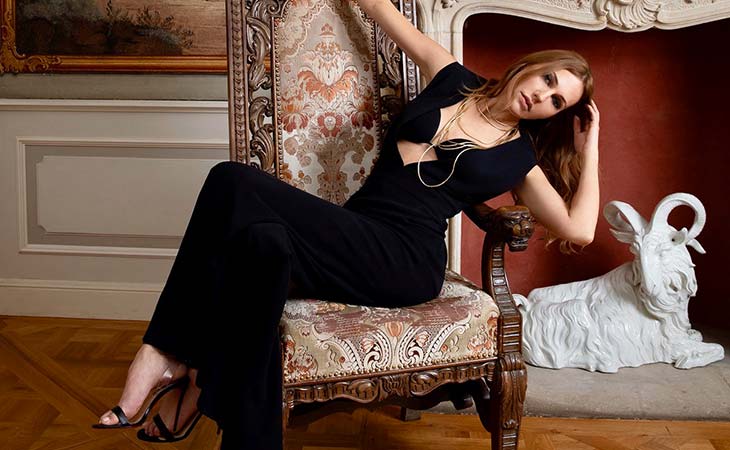Types of fabric thread are one of the most critical factors influencing the final quality of fabric and clothing. Choosing the right thread not only affects the final appearance of a garment but also plays a key role in its durability, comfort, and even artistic value. In the world of fashion and clothing design, thread is not just a basic component—it is a fundamental element in the creation of unique and long-lasting pieces. In this article, we will take a close look at different types of fabric threads, their uses, properties, advantages, and disadvantages to help you make informed decisions for designing and sewing special garments, especially evening dresses.
Table of Contents
- What Is Fabric Thread and Why Is It Important?
- General Classification of Fabric Threads
- Natural Threads: From Cotton to Silk
- Synthetic Threads: From Polyester to Nylon
- Blended Threads and Their Advantages
- Which Thread Is Best for Evening Wear?
- The Impact of Thread on Stitching and Garment Structure
- Key Points in Choosing the Right Fabric Thread
- Conclusion
- FAQs
1.What Is Fabric Thread and Why Is It Important?
Fabric thread is a thin, continuous strand of fibers that forms the basic structure of textiles through weaving or sewing. The quality, fiber content, thickness, and twist of a thread affect softness, gloss, structure, and brightness of the garment. Choosing the right thread becomes even more important when designing formal or evening wear.
Tips for Choosing Suitable Fabrics for Haute Couture Clothing in Winter
2.General Classification of Fabric Threads
Fabric threads generally fall into three main categories:
- Natural Threads
- Synthetic Threads
- Blended Threads Each type has unique characteristics, applications, and strengths or weaknesses, which will be examined in detail.
3.Natural Threads: From Cotton to Silk
Natural threads have long been favored by designers and consumers due to their comfort and compatibility with human skin. These threads are generally soft, breathable, durable, and environmentally sustainable. Plant-based threads like cotton and linen perform well in warm seasons, while animal-based threads like wool and silk add warmth or luxury, making them ideal for seasonal or formal designs. Natural threads not only enhance sewing quality and aesthetics but also provide a comfortable and pleasant wearing experience.
Natural threads are sourced from plant or animal materials and are highly popular in the fashion industry due to their unique properties. The two main types of natural threads are plant-based and animal-based.
A Journey Through Clothing Styles and Choosing the Right Outfit for Your Personality
Cotton Thread
One of the most widely used threads in the world, cotton thread is made from cotton plant fibers. It is known for its softness, breathability, and high moisture absorption. Cotton threads are ideal for everyday wear, summer clothing, and children’s garments.
Linen Thread
Linen is derived from the flax plant and is more durable than cotton. It has a natural, cool, and breathable texture, making it suitable for summer clothing, formal wear, and home garments.
Wool Thread
Wool thread comes from animals such as sheep, goats, angora, and alpaca. Due to its high insulation, wool is perfect for winter garments, suits, and formal coats.
Silk Thread
Silk is one of the most luxurious and expensive natural threads, produced from silkworm cocoons. This thread is shiny, soft, and very smooth, often used in evening gowns, formal dresses, and haute couture designs. In addition to its luxurious appearance, silk is also strong and lightweight, making it a favorite among designers.
What Shoes to Wear with an Evening Gown?
4.Synthetic Threads: From Polyester to Nylon
Synthetic threads are widely used in modern fashion. These are made from chemical-based materials:
Polyester Thread
One of the most common threads in mass production. Its high durability, wrinkle-resistance, and affordability make it popular, although it lacks the natural feel of organic threads.
Nylon Thread
Highly durable and elastic, nylon is ideal for sportswear and technical garments, though less commonly used in evening wear.
Viscose Thread
A semi-synthetic option derived from plant cellulose through chemical processes. It has high softness and is often used for semi-luxury garments.
Secrets of Looking Good: Choosing the Right Clothes and Accessories for Every Body Type
5.Blended Threads and Their Advantages
Blended threads are a mix of natural and synthetic fibers, designed to capture the best of both worlds. These threads are more resistant to wear, easier to care for, and often combine softness with strength. For example, blending cotton with polyester reduces wrinkling, increases durability, and lowers production costs. In fashion, blended threads enable designers to create high-performance, attractive textiles suited for everyday, sportswear, and even unique fashion pieces.
A Comprehensive Guide to Choosing the Perfect Evening Gown: Shine at Every Event!
6.Which Thread Is Best for Evening Wear?
Choosing the right thread for evening wear requires careful consideration of multiple factors: the drape, sheen, and durability of the fabric, as well as the overall aesthetic. Natural threads like silk are excellent for creating luxurious and elegant evening garments due to their soft touch and beautiful shine. However, for more durable designs or intricate embroidery, polyester or blended threads may be better suited. Often, a combination of threads is used—silk or rayon for visible stitches, and stronger synthetic threads for hidden seams.
Comprehensive Women’s Fashion and Style Guide
7.The Impact of Thread on Stitching and Garment Structure
Thread significantly affects not only the look but also the structure and durability of a garment. The tension, thickness, and elasticity of the thread influence how well the stitches hold together and how the garment falls on the body. A poor thread choice may result in puckering, loose stitches, or uncomfortable seams. For evening dresses, using high-quality thread ensures clean seams, better drape, and a more refined final look.
8.Key Points in Choosing the Right Fabric Thread
- Fabric Type: Match the thread to the fabric. Lightweight threads work best with delicate fabrics; stronger threads are needed for heavy materials.
- Color Matching: Choose thread color that blends in or enhances the fabric’s color depending on the design goal.
- Functionality: Consider if the garment needs stretch, shine, or high durability.
- Seam Placement: Use stronger thread for structural seams and decorative thread for visible or top stitches.
- Comfort: Threads touching the skin should be soft and non-irritating, especially for evening or formal wear.
Shine Bright at Night: Designing Evening Dresses with the Color of the Year 2025
9.Conclusion
Understanding the types of fabric thread and their characteristics plays a crucial role in garment design—especially for special and formal attire. Each type of thread, whether natural, synthetic, or blended, has its own set of strengths. The right choice can elevate the quality, comfort, and aesthetics of your design. For evening wear, the perfect thread brings together elegance, strength, and harmony with the chosen fabric.
10.FAQs
- Can I use regular cotton thread for an evening dress?
Yes, but only if the fabric is light and breathable. For more luxurious fabrics, silk or high-quality polyester is preferable. - What thread is best for sewing silk?
Fine silk thread or polyester thread designed for delicate fabrics is best for sewing silk. - Are blended threads better than pure threads?
They can be. Blended threads often offer a combination of strength, softness, and flexibility, making them ideal for many sewing applications.



